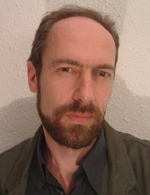

Undergrad |
Students enrolled for Honours psychology degrees at the University of Edinburgh can take the following parapsychology courses in their final year (Y4):
History of Unorthodox Psychology
Parapsychology
Details of these courses are given below. In addition to these taught courses, psychology students can undertake third and fourth year projects on parapsychological topics.
 History
of Unorthodox Psychology
History
of Unorthodox PsychologyAims and objectives
Offered as an option to students in the final year of their undergraduate Honours Psychology degree, this course explores the history of unorthodox psychological knowledge. Phrenology, Mesmerism, Spiritualism, Psychical Research and Parapsychology (sometimes called ‘Psychology’s occult doubles’) have been controversial areas in the history of Psychology. But why were they so controversial, and what were the controversies really about? We will consider key historical and conceptual issues in Psychology by examining the disputes over scientific status, the various attempts by both sides to convince the scientific community and the public, and the role of the mesmerists, mediums and mindreaders who demonstrated extraordinary psychological abilities.
Learning outcomes
By the end of the course, students will be able to demonstrate knowledge and understanding of: the historical development of (orthodox and unorthodox) psychology; the problem of demarcation in science and the concept of boundary-work; the role of social processes in the construction of psychological and scientific knowledge; the contribution of history to our understanding of psychology.
 Parapsychology
ParapsychologyGeneral Description
Offered as an option to students in the final year of their undergraduate Honours Psychology degree, the course assumes that most students have had little or no previous exposure to research in parapsychology. Parapsychology is defined as the scientific investigation of apparent new means of communication or influence between the organism and its environment, known as ‘psi’. The course does not presume that psi exists, but treats this as a scientifically-testable hypothesis and reviews the findings of laboratory psi research. Moving out of the lab, we also examine people’s real-life ‘paranormal’ experiences and beliefs, and the models that have been put forward to understand these. Finally, we consider the wider scientific implications of parapsychology.
Option Aims
To provide an overview of the principal methods, findings, and issues in parapsychology.To encourage critical thinking about scientific claims, in parapsychology and beyond.
Learning Outcomes
Students will become familiar with: the main methods used for controlled laboratory testing of claims of anomalous information transfer or influence; the findings of meta-analytic reviews of ganzfeld-ESP, PK-RNG, and DMILS research; the phenomenology of spontaneous paranormal experiences and the models that have been proposed to explain why people have these experiences; the methodological challenges involved in testing claims of anomalous communication or influence; factors leading to scientific controversies, and ways to help resolve controversies.
Back to main Teaching page